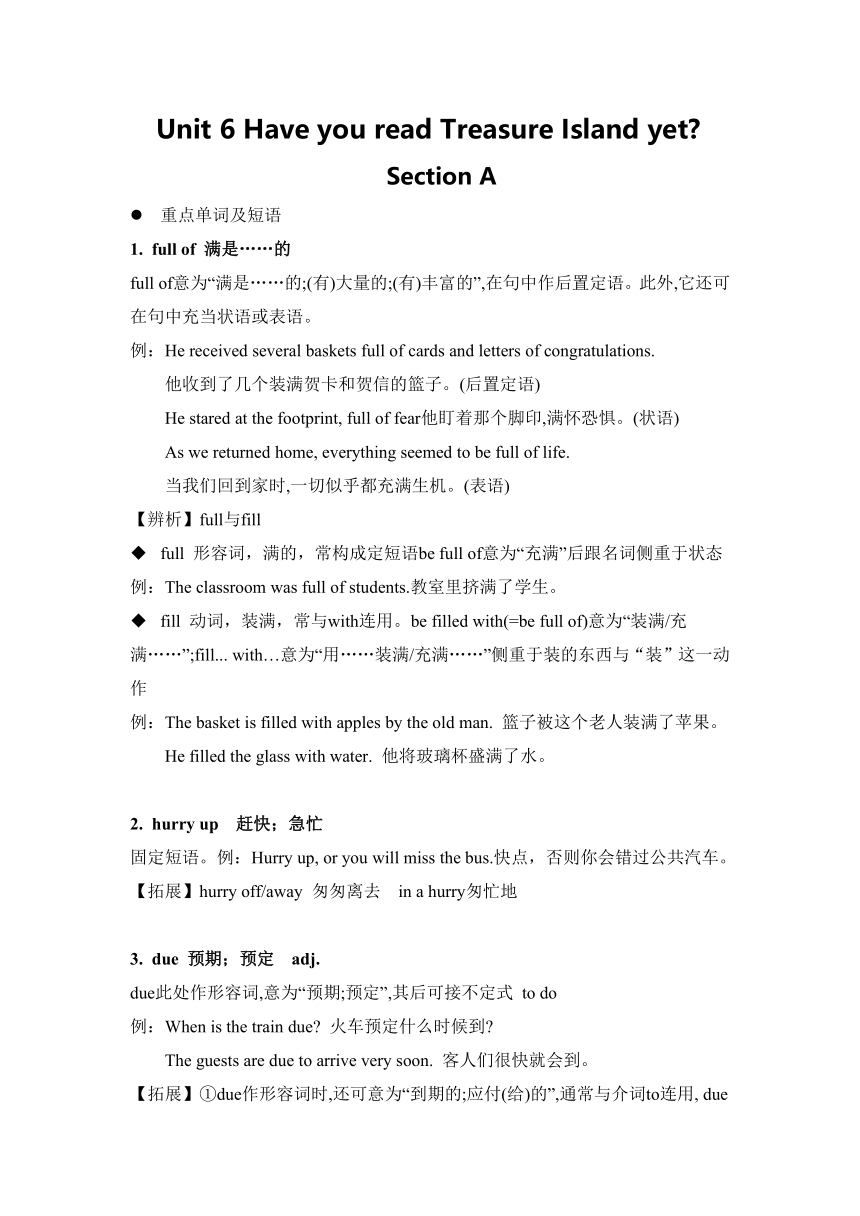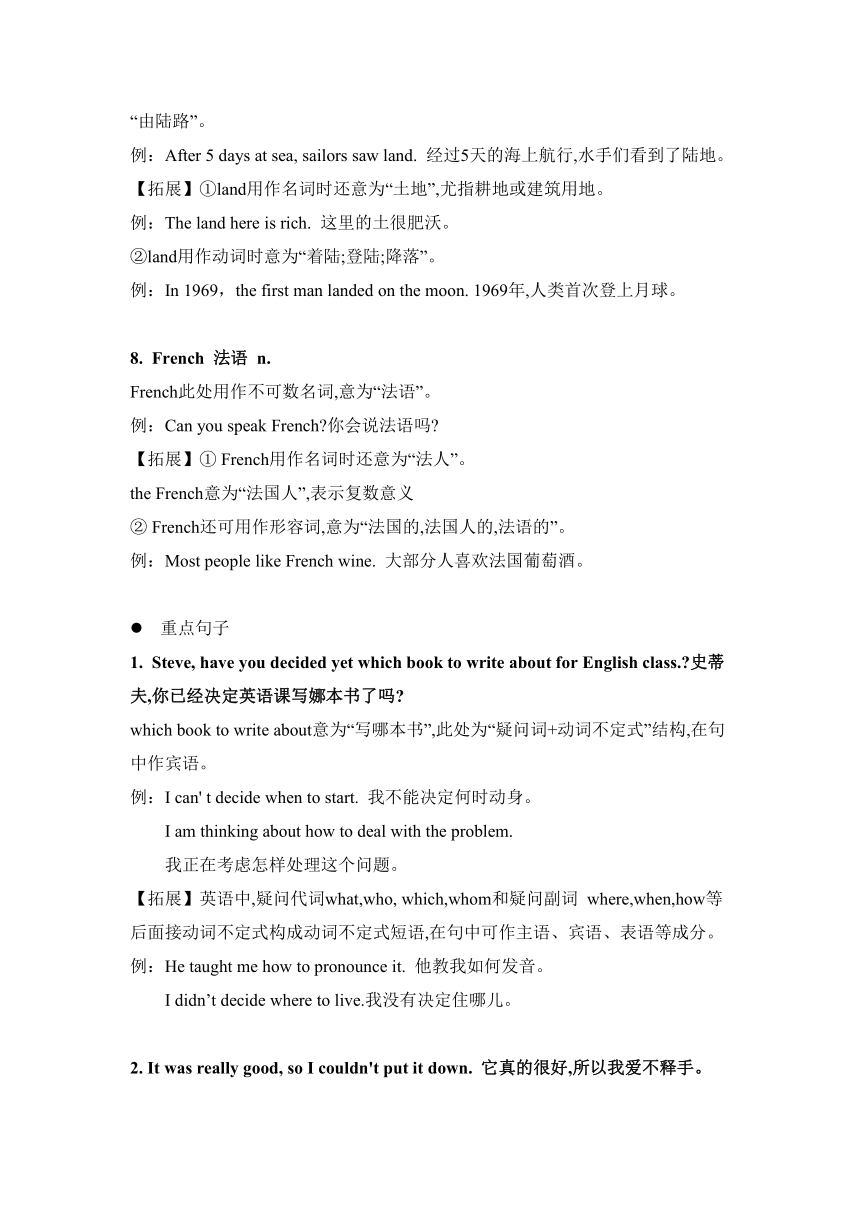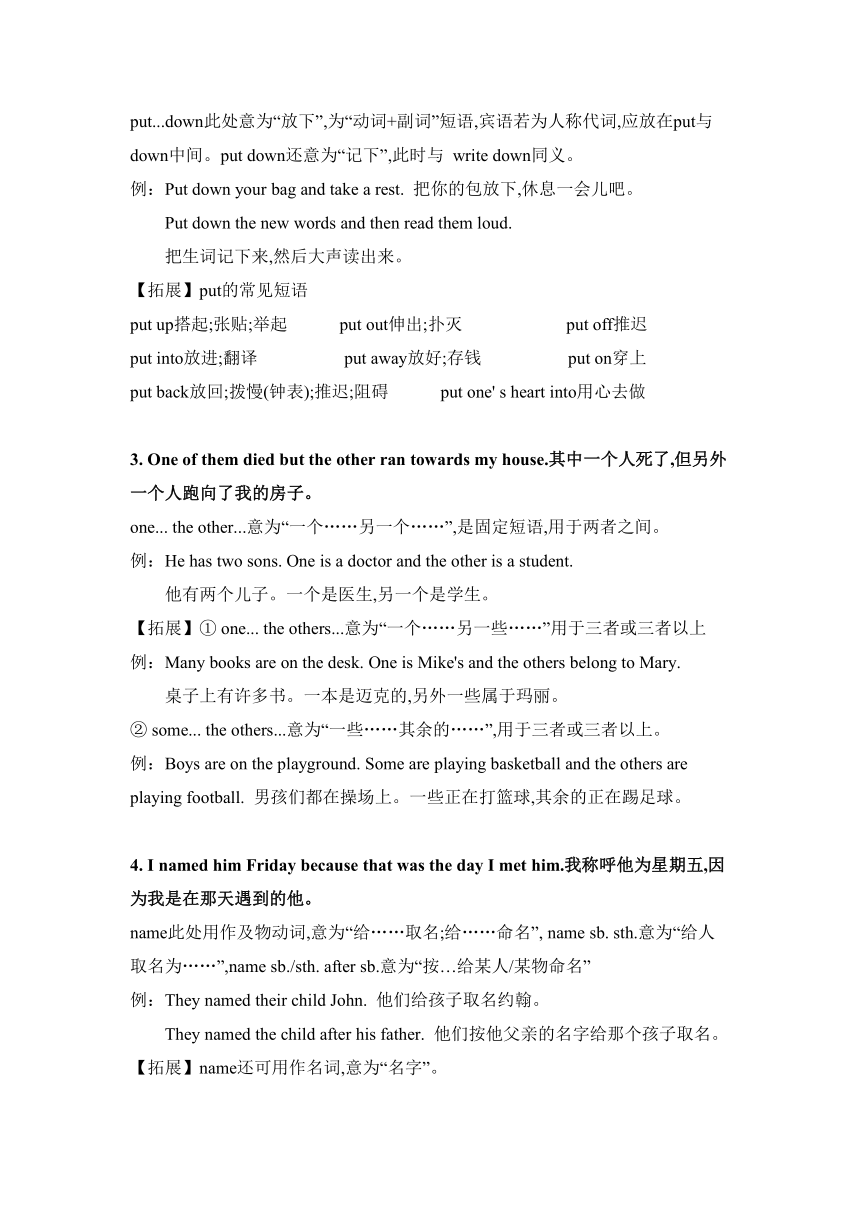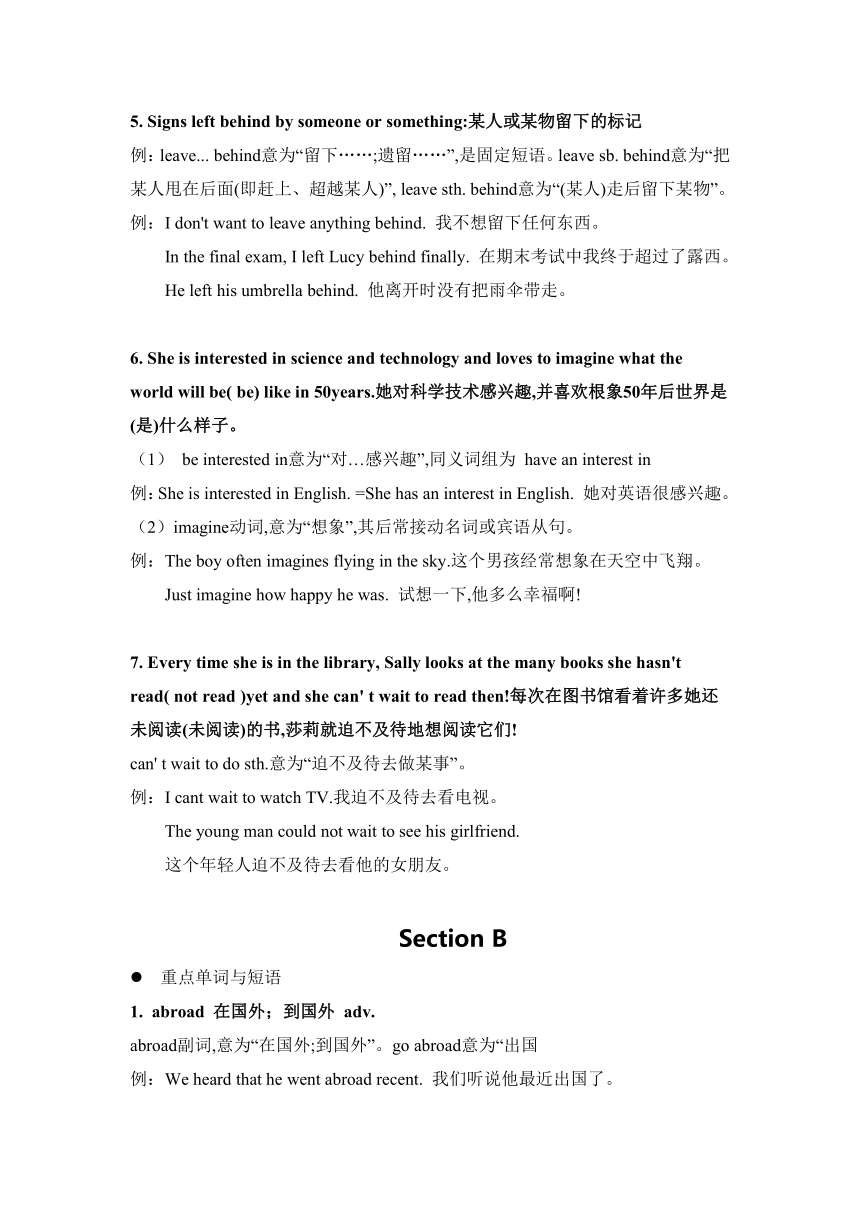鲁教版(五四制)英语八年级上册 Unit 6 Have you read Treasure Island yet 知识点讲义
文档属性
| 名称 | 鲁教版(五四制)英语八年级上册 Unit 6 Have you read Treasure Island yet 知识点讲义 |

|
|
| 格式 | docx | ||
| 文件大小 | 31.8KB | ||
| 资源类型 | 教案 | ||
| 版本资源 | 鲁教版 | ||
| 科目 | 英语 | ||
| 更新时间 | 2022-09-16 17:45:58 | ||
图片预览





文档简介
Unit 6 Have you read Treasure Island yet
Section A
重点单词及短语
full of 满是……的
full of意为“满是……的;(有)大量的;(有)丰富的”,在句中作后置定语。此外,它还可在句中充当状语或表语。
例:He received several baskets full of cards and letters of congratulations.
他收到了几个装满贺卡和贺信的篮子。(后置定语)
He stared at the footprint, full of fear他盯着那个脚印,满怀恐惧。(状语)
As we returned home, everything seemed to be full of life.
当我们回到家时,一切似乎都充满生机。(表语)
【辨析】full与fill
full 形容词,满的,常构成定短语be full of意为“充满”后跟名词侧重于状态
例:The classroom was full of students.教室里挤满了学生。
fill 动词,装满,常与with连用。be filled with(=be full of)意为“装满/充满……”;fill... with…意为“用……装满/充满……”侧重于装的东西与“装”这一动作
例:The basket is filled with apples by the old man. 篮子被这个老人装满了苹果。
He filled the glass with water. 他将玻璃杯盛满了水。
hurry up 赶快;急忙
固定短语。例:Hurry up, or you will miss the bus.快点,否则你会错过公共汽车。
【拓展】hurry off/away 匆匆离去 in a hurry匆忙地
due 预期;预定 adj.
due此处作形容词,意为“预期;预定”,其后可接不定式 to do
例:When is the train due 火车预定什么时候到
The guests are due to arrive very soon. 客人们很快就会到。
【拓展】①due作形容词时,还可意为“到期的;应付(给)的”,通常与介词to连用, due to sb.意为“应付给或应给予某人”。
例:The bill is due. 这张票据已到期。
A great deal of money is due to you. 要付给你一大笔钱。
② due to意为“由于;因为”,是固定短语,后跟代词或名词,相当于 because of
例:He didn’t come to school due to his illness. 他因生病没有来学校。
Her success was due to her hard work. 她的成功是因为她努力工作。
mark 迹象;记号;分数 n. / 做记号;打分 v.
mark此处用作可数名词,意为“痕迹;记号”the marks of..意为“……的痕迹”。
例:The dogs always make dirty marks. 这些狗总是制造斑斑污迹。
【拓展】mark还可用作动词,意为“做记号;做标记”。
例:Prices are marked on the goods. 价格标在商品上。
sand 沙滩;沙 n.
sand名词,on the sand意为“在沙滩上”
例:Lying on the sand is very comfortable in the sun. 在阳光下躺在沙滩上很舒服。
【拓展】sand还可作不可数名词,意为“沙子”
例:There is some sand in my shoe. 我的一只鞋里有沙子。
towards 朝;向;对着 prep.
towards介词,意为“朝,向;对着”。
例:They drove towards the beach. 他们驾车朝海滩开去。
All the windows face towards the river. 所有的窗户都朝向河。
【拓展】 towards用作介词时还意为“对于,关于”,指对某人或某事的感觉、态度等。
例:Tom’s attitude towards his work has been very positive.
汤姆对工作的态度一直很积极。
land 陆地;大地 n.
land此处用作不可数名词,意为“陆地,大地”。on land意为“在陆地上”, by land意为“由陆路”。
例:After 5 days at sea, sailors saw land. 经过5天的海上航行,水手们看到了陆地。
【拓展】①land用作名词时还意为“土地”,尤指耕地或建筑用地。
例:The land here is rich. 这里的土很肥沃。
②land用作动词时意为“着陆;登陆;降落”。
例:In 1969,the first man landed on the moon. 1969年,人类首次登上月球。
French 法语 n.
French此处用作不可数名词,意为“法语”。
例:Can you speak French 你会说法语吗
【拓展】① French用作名词时还意为“法人”。
the French意为“法国人”,表示复数意义
② French还可用作形容词,意为“法国的,法国人的,法语的”。
例:Most people like French wine. 大部分人喜欢法国葡萄酒。
重点句子
Steve, have you decided yet which book to write about for English class. 史蒂夫,你已经决定英语课写娜本书了吗
which book to write about意为“写哪本书”,此处为“疑问词+动词不定式”结构,在句中作宾语。
例:I can' t decide when to start. 我不能决定何时动身。
I am thinking about how to deal with the problem.
我正在考虑怎样处理这个问题。
【拓展】英语中,疑问代词what,who, which,whom和疑问副词 where,when,how等后面接动词不定式构成动词不定式短语,在句中可作主语、宾语、表语等成分。
例:He taught me how to pronounce it. 他教我如何发音。
I didn’t decide where to live.我没有决定住哪儿。
2. It was really good, so I couldn't put it down. 它真的很好,所以我爱不释手。put...down此处意为“放下”,为“动词+副词”短语,宾语若为人称代词,应放在put与down中间。put down还意为“记下”,此时与 write down同义。
例:Put down your bag and take a rest. 把你的包放下,休息一会儿吧。
Put down the new words and then read them loud.
把生词记下来,然后大声读出来。
【拓展】put的常见短语
put up搭起;张贴;举起 put out伸出;扑灭 put off推迟
put into放进;翻译 put away放好;存钱 put on穿上
put back放回;拨慢(钟表);推迟;阻碍 put one' s heart into用心去做
3. One of them died but the other ran towards my house.其中一个人死了,但另外一个人跑向了我的房子。
one... the other...意为“一个……另一个……”,是固定短语,用于两者之间。
例:He has two sons. One is a doctor and the other is a student.
他有两个儿子。一个是医生,另一个是学生。
【拓展】① one... the others...意为“一个……另一些……”用于三者或三者以上
例:Many books are on the desk. One is Mike's and the others belong to Mary.
桌子上有许多书。一本是迈克的,另外一些属于玛丽。
② some... the others...意为“一些……其余的……”,用于三者或三者以上。
例:Boys are on the playground. Some are playing basketball and the others are playing football. 男孩们都在操场上。一些正在打篮球,其余的正在踢足球。
4. I named him Friday because that was the day I met him.我称呼他为星期五,因为我是在那天遇到的他。
name此处用作及物动词,意为“给……取名;给……命名”, name sb. sth.意为“给人取名为……”,name sb./sth. after sb.意为“按…给某人/某物命名”
例:They named their child John. 他们给孩子取名约翰。
They named the child after his father. 他们按他父亲的名字给那个孩子取名。
【拓展】name还可用作名词,意为“名字”。
5. Signs left behind by someone or something:某人或某物留下的标记
例:leave... behind意为“留下……;遗留……”,是固定短语。leave sb. behind意为“把某人甩在后面(即赶上、超越某人)”, leave sth. behind意为“(某人)走后留下某物”。
例:I don't want to leave anything behind. 我不想留下任何东西。
In the final exam, I left Lucy behind finally. 在期末考试中我终于超过了露西。
He left his umbrella behind. 他离开时没有把雨伞带走。
6. She is interested in science and technology and loves to imagine what the world will be( be) like in 50years.她对科学技术感兴趣,并喜欢根象50年后世界是(是)什么样子。
be interested in意为“对…感兴趣”,同义词组为 have an interest in
例:She is interested in English. =She has an interest in English. 她对英语很感兴趣。
(2)imagine动词,意为“想象”,其后常接动名词或宾语从句。
例:The boy often imagines flying in the sky.这个男孩经常想象在天空中飞翔。
Just imagine how happy he was. 试想一下,他多么幸福啊!
7. Every time she is in the library, Sally looks at the many books she hasn't read( not read )yet and she can' t wait to read then!每次在图书馆看着许多她还未阅读(未阅读)的书,莎莉就迫不及待地想阅读它们!
can' t wait to do sth.意为“迫不及待去做某事”。
例:I cant wait to watch TV.我迫不及待去看电视。
The young man could not wait to see his girlfriend.
这个年轻人迫不及待去看他的女朋友。
Section B
重点单词与短语
abroad 在国外;到国外 adv.
abroad副词,意为“在国外;到国外”。go abroad意为“出国
例:We heard that he went abroad recent. 我们听说他最近出国了。
【注意】abroad不能与in,to,at等介词连用,其前也不用加冠词,但可与介词from连用。
例:He was abroad from 1970 to 1996. 他从1970年至1996年在国外。
actually 真实地;事实上 adv.
actually副词,意为“真实地;事实上”,相当于in fact
例:I know she looks young, but she is actually 50.
我知道她看起来很年轻,但实际上她50岁了。
southern 南方的 adj.
southern形容词,意为“南方的”,其名词形式为south,意为“南方”。
例:They live in the southern area.他们住在南部地区。
【拓展】常见的表示方位的形容词: eastern东方的;western西方的; southern南方的; northern北方的;northeastern东北方的; northwestern西北方的southeastern东南方的; southwester西南方的。
belong 属于;归属 v.
belong此处作不及物动词,意为“属于;归属”。常与介词to连用, belong to意为“属于……”,不用于进行时态和被动
【注意】belong to后接名词或人称代词的宾格形式,但后面不能名词性物主代词或名词所有格。
例:That book belongs to me.那本书属于我。
【拓展】 belong to sb.(属于某人)可与 be one's(是某人的)进行同义句改写。
例:It must belong to Carla. =It must be Carla’s它一定属于卡拉。
laughter 笑,笑声 n.
名词,意为“笑,笑声”。
例:Their laughter filled the whole room. 他们的笑声充满了整个房间。
【拓展】laugh动词,意为笑;大笑”。laugh at意为“嘲笑
例:His funny look made the children laugh. 他滑稽的样子使孩子们大笑。
beauty 美;美丽 n.
其形容词 beautiful意为“美丽的”。
例:The beauty of the West Lake attracts millions of visitors.
西湖的美吸引了数百万的游客。
I love autumn because it's beautiful. 我喜欢秋天,因为它很美。
million 一百万 num.
million数词,意为“百万”,常见用法如下
①与具体数字连用时,用单数,表示“几百万”。
例:He was prepared to pay two million dollars. 他愿意支付200万美元。
②后接of时应加-s,即 millions of,意为“数以百万计的;上百万的”,表泛指。
例:They planted millions of trees. 他们种植了上百万棵树。
【拓展】与 million用法相同的数词还有 hundred“百”, thousand“千”, billion“十亿”。例:The sun is shining. Thousands of people are lying on the beach.
阳光灿烂。许许多多的人躺在沙滩上。
introduce 介绍;引荐 v.
introduce及物动词,意为“介绍”。introduce sb./sth. to sb.意为“向某人介绍…"。introduce oneself意为“自我介绍”
例:Let me introduce my friend to you. 让我给你介绍一下我的朋友。
Permit me to introduce myself, please. 请允许我介绍自己。
【拓展】 introduction用作可数名词,意为“介绍,引见”。
例:Our speaker today needs no introduction. 我们今天的发言人就不必介绍了。
重点句子
The Toms must be popular.汤姆乐队一定是家喻户晓的。
must be意为“一定是;必定是”,表示肯定推测,为情态动词+be”结构,表示说话者有把握的推断。
例:There must be a mistake.一定是弄错了。
The light is on. Mary must be in. 灯亮着。玛丽一定在里面。
【拓展】can't be意为“不可能是”,表示否定推测。
例:This basketball cant be Tony's. He doesn’t like playing basketball at all.
这个篮球不可能是托尼的。他一点儿也不喜欢打篮球。
When Sarah was a teenager, she used to fight over almost everything with her family..当莎拉是一个青少年的时候,她常常因几乎所有的事与她的家人争吵。
fight over意为“因为某事而争论/争吵”,是固定短语,还可写作 fight about. fight过去式为fought, 可用作动词,意为“战斗”。
例:The two dogs were fighting over a bone. 两只狗为一块骨头在撕咬。
Don' t fight about small things. 不要为琐事争吵。
【拓展】① fight against/with sb. sth.意为“与……搏斗、打架、作战”。 fight for sth.意为“努力争取;为……而斗争”。
例:The men were fighting for higher wages. 那些人在争取加薪。
②fight还可用作名词,意为“争论;争吵”, have a fight with意为“与……争论”。
例:Did you have a fight with him 你和他争辩了吗
She came to realize how much she actually missed all of them.她逐渐意识到,事实上她是多么想念他们所有的人。
come to do sth.此处意为“逐渐做某事;终于做某事”,表示达到某种状态,常与know, understand, realize,be,love,like等动词连用,强调渐变过程。此结构与 get to do sth.(逐渐做某事)同义。
例:How did you come to know him 你是怎么认识他的
When you get older, you' ll come to realize how much your parents have done for you. 当你逐渐长大时,你会逐渐意识到你的父母为你付出了多少。
【拓展】 come to do sth.还可意为“来做/从事某事”。
例:Excuse me, would you like to come to help me with my English
打扰了,你愿意来帮助我学英语吗
how much意为“多么”,用来表示程度。
例:You never know how much I miss my parents.
你永远不知道我是多么想念我的父母。
Sarah hasn't been to Nashville yet, but it is her dream to go there one day.莎拉还没去过纳什维尔,但有一天能去那里是她的梦想。
have/has been to.意为“(曾经)去过某地”。
例:Have you been to Beijing before 你以前去过北京吗
I have never been to Shanghai. 我从来没有去过上海。
【辨析】 have/has been to, have/has gone to与 have/has been in
have/has been to (曾经)去过(某地) 表示过去曾经去过,即人已回到说话处,常与ever和 never连用,接地点副词时to要省略
例:He has been to Beijing.他去过北京。
have/has gone to 去了(某地) 表示不在说话者所在的地方,已经到达目的地或在去目的地的途中
例:Where is your father 你爸爸在哪里
He has gone to Beijing.他去了北京。
have/has been in/ 在(某地) 表示在某地(一段时间),通常与表示一段时间的时间状语连用
例:He has been in Beijing for five years. 他在北京5年了。
后一分句为“It is+名词(短语)(+ for sb.)+to do sth."结构,意为“(对某人而言)某事是……"。
例:It's not a good idea for us to copy the homework.
对我们而言,抄袭作业不是一个好主意。
The number of records he has sold:他已售出的唱片数量:
the number of意为“……的数量”,后接可数名词复数,作主语时,谓语动词要用单数形式。
例:The number of visitors to Hong Kong has now increased.
现在去香港参观的人数已增加。
【辨析】 a number of与 the number of
a number of意为“许多”,相当于many或a lot of,后接可数名词复数。作主语时,谓语动词用复数。 number前可用 large, small等修饰,表示程度。
例:A number of students are planting trees on the hill. 许多学生在小山上植树。
the number of意为“……的数量”,后接名词复数作主语时,谓语动词要用单数。
例:The number of students in our class is 50. 我们班学生的数量是50。
Section A
重点单词及短语
full of 满是……的
full of意为“满是……的;(有)大量的;(有)丰富的”,在句中作后置定语。此外,它还可在句中充当状语或表语。
例:He received several baskets full of cards and letters of congratulations.
他收到了几个装满贺卡和贺信的篮子。(后置定语)
He stared at the footprint, full of fear他盯着那个脚印,满怀恐惧。(状语)
As we returned home, everything seemed to be full of life.
当我们回到家时,一切似乎都充满生机。(表语)
【辨析】full与fill
full 形容词,满的,常构成定短语be full of意为“充满”后跟名词侧重于状态
例:The classroom was full of students.教室里挤满了学生。
fill 动词,装满,常与with连用。be filled with(=be full of)意为“装满/充满……”;fill... with…意为“用……装满/充满……”侧重于装的东西与“装”这一动作
例:The basket is filled with apples by the old man. 篮子被这个老人装满了苹果。
He filled the glass with water. 他将玻璃杯盛满了水。
hurry up 赶快;急忙
固定短语。例:Hurry up, or you will miss the bus.快点,否则你会错过公共汽车。
【拓展】hurry off/away 匆匆离去 in a hurry匆忙地
due 预期;预定 adj.
due此处作形容词,意为“预期;预定”,其后可接不定式 to do
例:When is the train due 火车预定什么时候到
The guests are due to arrive very soon. 客人们很快就会到。
【拓展】①due作形容词时,还可意为“到期的;应付(给)的”,通常与介词to连用, due to sb.意为“应付给或应给予某人”。
例:The bill is due. 这张票据已到期。
A great deal of money is due to you. 要付给你一大笔钱。
② due to意为“由于;因为”,是固定短语,后跟代词或名词,相当于 because of
例:He didn’t come to school due to his illness. 他因生病没有来学校。
Her success was due to her hard work. 她的成功是因为她努力工作。
mark 迹象;记号;分数 n. / 做记号;打分 v.
mark此处用作可数名词,意为“痕迹;记号”the marks of..意为“……的痕迹”。
例:The dogs always make dirty marks. 这些狗总是制造斑斑污迹。
【拓展】mark还可用作动词,意为“做记号;做标记”。
例:Prices are marked on the goods. 价格标在商品上。
sand 沙滩;沙 n.
sand名词,on the sand意为“在沙滩上”
例:Lying on the sand is very comfortable in the sun. 在阳光下躺在沙滩上很舒服。
【拓展】sand还可作不可数名词,意为“沙子”
例:There is some sand in my shoe. 我的一只鞋里有沙子。
towards 朝;向;对着 prep.
towards介词,意为“朝,向;对着”。
例:They drove towards the beach. 他们驾车朝海滩开去。
All the windows face towards the river. 所有的窗户都朝向河。
【拓展】 towards用作介词时还意为“对于,关于”,指对某人或某事的感觉、态度等。
例:Tom’s attitude towards his work has been very positive.
汤姆对工作的态度一直很积极。
land 陆地;大地 n.
land此处用作不可数名词,意为“陆地,大地”。on land意为“在陆地上”, by land意为“由陆路”。
例:After 5 days at sea, sailors saw land. 经过5天的海上航行,水手们看到了陆地。
【拓展】①land用作名词时还意为“土地”,尤指耕地或建筑用地。
例:The land here is rich. 这里的土很肥沃。
②land用作动词时意为“着陆;登陆;降落”。
例:In 1969,the first man landed on the moon. 1969年,人类首次登上月球。
French 法语 n.
French此处用作不可数名词,意为“法语”。
例:Can you speak French 你会说法语吗
【拓展】① French用作名词时还意为“法人”。
the French意为“法国人”,表示复数意义
② French还可用作形容词,意为“法国的,法国人的,法语的”。
例:Most people like French wine. 大部分人喜欢法国葡萄酒。
重点句子
Steve, have you decided yet which book to write about for English class. 史蒂夫,你已经决定英语课写娜本书了吗
which book to write about意为“写哪本书”,此处为“疑问词+动词不定式”结构,在句中作宾语。
例:I can' t decide when to start. 我不能决定何时动身。
I am thinking about how to deal with the problem.
我正在考虑怎样处理这个问题。
【拓展】英语中,疑问代词what,who, which,whom和疑问副词 where,when,how等后面接动词不定式构成动词不定式短语,在句中可作主语、宾语、表语等成分。
例:He taught me how to pronounce it. 他教我如何发音。
I didn’t decide where to live.我没有决定住哪儿。
2. It was really good, so I couldn't put it down. 它真的很好,所以我爱不释手。put...down此处意为“放下”,为“动词+副词”短语,宾语若为人称代词,应放在put与down中间。put down还意为“记下”,此时与 write down同义。
例:Put down your bag and take a rest. 把你的包放下,休息一会儿吧。
Put down the new words and then read them loud.
把生词记下来,然后大声读出来。
【拓展】put的常见短语
put up搭起;张贴;举起 put out伸出;扑灭 put off推迟
put into放进;翻译 put away放好;存钱 put on穿上
put back放回;拨慢(钟表);推迟;阻碍 put one' s heart into用心去做
3. One of them died but the other ran towards my house.其中一个人死了,但另外一个人跑向了我的房子。
one... the other...意为“一个……另一个……”,是固定短语,用于两者之间。
例:He has two sons. One is a doctor and the other is a student.
他有两个儿子。一个是医生,另一个是学生。
【拓展】① one... the others...意为“一个……另一些……”用于三者或三者以上
例:Many books are on the desk. One is Mike's and the others belong to Mary.
桌子上有许多书。一本是迈克的,另外一些属于玛丽。
② some... the others...意为“一些……其余的……”,用于三者或三者以上。
例:Boys are on the playground. Some are playing basketball and the others are playing football. 男孩们都在操场上。一些正在打篮球,其余的正在踢足球。
4. I named him Friday because that was the day I met him.我称呼他为星期五,因为我是在那天遇到的他。
name此处用作及物动词,意为“给……取名;给……命名”, name sb. sth.意为“给人取名为……”,name sb./sth. after sb.意为“按…给某人/某物命名”
例:They named their child John. 他们给孩子取名约翰。
They named the child after his father. 他们按他父亲的名字给那个孩子取名。
【拓展】name还可用作名词,意为“名字”。
5. Signs left behind by someone or something:某人或某物留下的标记
例:leave... behind意为“留下……;遗留……”,是固定短语。leave sb. behind意为“把某人甩在后面(即赶上、超越某人)”, leave sth. behind意为“(某人)走后留下某物”。
例:I don't want to leave anything behind. 我不想留下任何东西。
In the final exam, I left Lucy behind finally. 在期末考试中我终于超过了露西。
He left his umbrella behind. 他离开时没有把雨伞带走。
6. She is interested in science and technology and loves to imagine what the world will be( be) like in 50years.她对科学技术感兴趣,并喜欢根象50年后世界是(是)什么样子。
be interested in意为“对…感兴趣”,同义词组为 have an interest in
例:She is interested in English. =She has an interest in English. 她对英语很感兴趣。
(2)imagine动词,意为“想象”,其后常接动名词或宾语从句。
例:The boy often imagines flying in the sky.这个男孩经常想象在天空中飞翔。
Just imagine how happy he was. 试想一下,他多么幸福啊!
7. Every time she is in the library, Sally looks at the many books she hasn't read( not read )yet and she can' t wait to read then!每次在图书馆看着许多她还未阅读(未阅读)的书,莎莉就迫不及待地想阅读它们!
can' t wait to do sth.意为“迫不及待去做某事”。
例:I cant wait to watch TV.我迫不及待去看电视。
The young man could not wait to see his girlfriend.
这个年轻人迫不及待去看他的女朋友。
Section B
重点单词与短语
abroad 在国外;到国外 adv.
abroad副词,意为“在国外;到国外”。go abroad意为“出国
例:We heard that he went abroad recent. 我们听说他最近出国了。
【注意】abroad不能与in,to,at等介词连用,其前也不用加冠词,但可与介词from连用。
例:He was abroad from 1970 to 1996. 他从1970年至1996年在国外。
actually 真实地;事实上 adv.
actually副词,意为“真实地;事实上”,相当于in fact
例:I know she looks young, but she is actually 50.
我知道她看起来很年轻,但实际上她50岁了。
southern 南方的 adj.
southern形容词,意为“南方的”,其名词形式为south,意为“南方”。
例:They live in the southern area.他们住在南部地区。
【拓展】常见的表示方位的形容词: eastern东方的;western西方的; southern南方的; northern北方的;northeastern东北方的; northwestern西北方的southeastern东南方的; southwester西南方的。
belong 属于;归属 v.
belong此处作不及物动词,意为“属于;归属”。常与介词to连用, belong to意为“属于……”,不用于进行时态和被动
【注意】belong to后接名词或人称代词的宾格形式,但后面不能名词性物主代词或名词所有格。
例:That book belongs to me.那本书属于我。
【拓展】 belong to sb.(属于某人)可与 be one's(是某人的)进行同义句改写。
例:It must belong to Carla. =It must be Carla’s它一定属于卡拉。
laughter 笑,笑声 n.
名词,意为“笑,笑声”。
例:Their laughter filled the whole room. 他们的笑声充满了整个房间。
【拓展】laugh动词,意为笑;大笑”。laugh at意为“嘲笑
例:His funny look made the children laugh. 他滑稽的样子使孩子们大笑。
beauty 美;美丽 n.
其形容词 beautiful意为“美丽的”。
例:The beauty of the West Lake attracts millions of visitors.
西湖的美吸引了数百万的游客。
I love autumn because it's beautiful. 我喜欢秋天,因为它很美。
million 一百万 num.
million数词,意为“百万”,常见用法如下
①与具体数字连用时,用单数,表示“几百万”。
例:He was prepared to pay two million dollars. 他愿意支付200万美元。
②后接of时应加-s,即 millions of,意为“数以百万计的;上百万的”,表泛指。
例:They planted millions of trees. 他们种植了上百万棵树。
【拓展】与 million用法相同的数词还有 hundred“百”, thousand“千”, billion“十亿”。例:The sun is shining. Thousands of people are lying on the beach.
阳光灿烂。许许多多的人躺在沙滩上。
introduce 介绍;引荐 v.
introduce及物动词,意为“介绍”。introduce sb./sth. to sb.意为“向某人介绍…"。introduce oneself意为“自我介绍”
例:Let me introduce my friend to you. 让我给你介绍一下我的朋友。
Permit me to introduce myself, please. 请允许我介绍自己。
【拓展】 introduction用作可数名词,意为“介绍,引见”。
例:Our speaker today needs no introduction. 我们今天的发言人就不必介绍了。
重点句子
The Toms must be popular.汤姆乐队一定是家喻户晓的。
must be意为“一定是;必定是”,表示肯定推测,为情态动词+be”结构,表示说话者有把握的推断。
例:There must be a mistake.一定是弄错了。
The light is on. Mary must be in. 灯亮着。玛丽一定在里面。
【拓展】can't be意为“不可能是”,表示否定推测。
例:This basketball cant be Tony's. He doesn’t like playing basketball at all.
这个篮球不可能是托尼的。他一点儿也不喜欢打篮球。
When Sarah was a teenager, she used to fight over almost everything with her family..当莎拉是一个青少年的时候,她常常因几乎所有的事与她的家人争吵。
fight over意为“因为某事而争论/争吵”,是固定短语,还可写作 fight about. fight过去式为fought, 可用作动词,意为“战斗”。
例:The two dogs were fighting over a bone. 两只狗为一块骨头在撕咬。
Don' t fight about small things. 不要为琐事争吵。
【拓展】① fight against/with sb. sth.意为“与……搏斗、打架、作战”。 fight for sth.意为“努力争取;为……而斗争”。
例:The men were fighting for higher wages. 那些人在争取加薪。
②fight还可用作名词,意为“争论;争吵”, have a fight with意为“与……争论”。
例:Did you have a fight with him 你和他争辩了吗
She came to realize how much she actually missed all of them.她逐渐意识到,事实上她是多么想念他们所有的人。
come to do sth.此处意为“逐渐做某事;终于做某事”,表示达到某种状态,常与know, understand, realize,be,love,like等动词连用,强调渐变过程。此结构与 get to do sth.(逐渐做某事)同义。
例:How did you come to know him 你是怎么认识他的
When you get older, you' ll come to realize how much your parents have done for you. 当你逐渐长大时,你会逐渐意识到你的父母为你付出了多少。
【拓展】 come to do sth.还可意为“来做/从事某事”。
例:Excuse me, would you like to come to help me with my English
打扰了,你愿意来帮助我学英语吗
how much意为“多么”,用来表示程度。
例:You never know how much I miss my parents.
你永远不知道我是多么想念我的父母。
Sarah hasn't been to Nashville yet, but it is her dream to go there one day.莎拉还没去过纳什维尔,但有一天能去那里是她的梦想。
have/has been to.意为“(曾经)去过某地”。
例:Have you been to Beijing before 你以前去过北京吗
I have never been to Shanghai. 我从来没有去过上海。
【辨析】 have/has been to, have/has gone to与 have/has been in
have/has been to (曾经)去过(某地) 表示过去曾经去过,即人已回到说话处,常与ever和 never连用,接地点副词时to要省略
例:He has been to Beijing.他去过北京。
have/has gone to 去了(某地) 表示不在说话者所在的地方,已经到达目的地或在去目的地的途中
例:Where is your father 你爸爸在哪里
He has gone to Beijing.他去了北京。
have/has been in/ 在(某地) 表示在某地(一段时间),通常与表示一段时间的时间状语连用
例:He has been in Beijing for five years. 他在北京5年了。
后一分句为“It is+名词(短语)(+ for sb.)+to do sth."结构,意为“(对某人而言)某事是……"。
例:It's not a good idea for us to copy the homework.
对我们而言,抄袭作业不是一个好主意。
The number of records he has sold:他已售出的唱片数量:
the number of意为“……的数量”,后接可数名词复数,作主语时,谓语动词要用单数形式。
例:The number of visitors to Hong Kong has now increased.
现在去香港参观的人数已增加。
【辨析】 a number of与 the number of
a number of意为“许多”,相当于many或a lot of,后接可数名词复数。作主语时,谓语动词用复数。 number前可用 large, small等修饰,表示程度。
例:A number of students are planting trees on the hill. 许多学生在小山上植树。
the number of意为“……的数量”,后接名词复数作主语时,谓语动词要用单数。
例:The number of students in our class is 50. 我们班学生的数量是50。
同课章节目录
- Unit 1 Could you please clean your room?
- Section A
- Section B
- Unit 2 Why don't you talk to your parents?
- Section A
- Section B
- Unit 3 What were you doing when the rainstorm came
- Section A
- Section B
- Unit 4 An old man tried to move the mountains.
- Section A
- Section B
- Unit 5 What's the highest mountain in the world?
- Section A
- Section B
- Unit 6 Have you read Treasure Island yet?
- Section A
- Section B
- Unit 7 Have you ever been to a museum?
- Section A
- Section B
- Unit 8 I've had this bike for three years.
- Section A
- Section B
